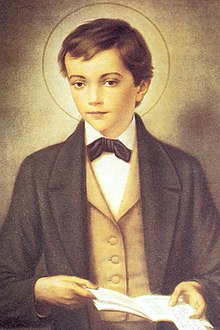Dominic Savio
| Saint Dominic Savio | |
|---|---|

A prayer card depicting St. Dominic Savio.
|
|
| Confessor | |
| Born |
April 2, 1842 San Giovanni, a frazione of Riva presso Chieri, Piedmont, Italy |
| Died | March 9, 1857 (aged 14) Mondonio, a frazione of Castelnuovo d’Asti (today Castelnuovo Don Bosco), Piedmont, Italy |
| Venerated in | Roman Catholic Church & Episcopal Church |
| Beatified | 5 March 1950, Rome by Pope Pius XII |
| Canonized | 12 June 1954, Rome by Pope Pius XII |
| Major shrine | The Basilica of Mary Help of Christians in Turin (his tomb) |
| Feast | 6 May(formerly 9 March) |
| Patronage | choirboys, falsely accused people, juvenile delinquents |
Dominic Savio (Italian: Domenico Savio; April 2, 1842 – March 9, 1857) was an Italian adolescent student of Saint John Bosco. He was studying to be a priest when he became ill and died at the age of 14, possibly from pleurisy.
His teacher, John Bosco, regarded Savio very highly, and wrote a biography of his young student, The Life of Dominic Savio. This volume, along with other accounts of him, were critical factors in his cause for sainthood. Despite the fact that many people considered him to have died at too young an age – fourteen – to be considered for sainthood, he was considered eligible for such singular honour on the basis of his having displayed "heroic virtue" in his everyday life. He is the only person of his age group who was declared a saint not on the basis of his having been a martyr, but on the basis of having lived what was seen as a holy life. Savio was canonised a saint on June 12, 1954, by Pope Pius XII, making him the youngest non-martyr to be canonised in the Catholic Church.
The major part of the biographical information known about Dominic Savio comes from his biography written by John Bosco, in addition to the testimonies given by Savio's family and friends.
On April 2, 1842 in the village of Riva, 2 miles (3 km) from the town of Chieri, in Piedmont, northern Italy a son was born to Carlo and Brigitta Savio.) He was given the name Domenico at baptism. The name Domenico means "belonging to God" and the name Savio means "wise". His parents had ten children in all. His father was a blacksmith and his mother, a seamstress. They were poor, hardworking and pious.
...
Wikipedia
